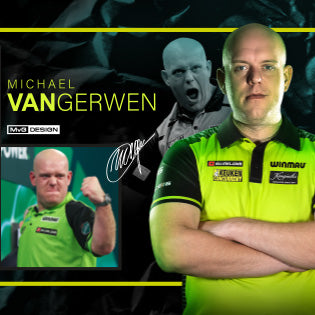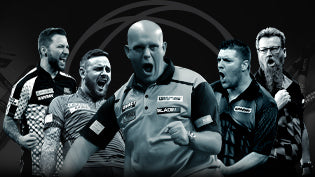
DR DARTS NEWSLETTER - PATRICK CHAPLIN - JANUARY'24 EDITION

Beginning to write this article on 12th January and looking back at the events of the past two/three weeks, one has to wonder “What happened there?”

Those who became fascinated by Luke Littler and his achievements, including beating three former World Champions, must have wondered what was going on. Littler lived up to the hype and very nearly took the title.
While it seemed the world was focused totally on Littler, Luke Humphries, (the world champion in waiting and favourite to win the title) seemed to be forgotten by the media. How did he feel as almost all of the media attention moved, moment by moment, and then very quickly, on to 16-year-old Littler after his stunning victory over Christian Kist, and his starting odds of 150/1 began to tumble.
A year or so before, Luke Humphries might well have been affronted by it but he, it seems, let the ‘Luke the Nuke’ madness wash over him. But now, Humphreys know how good he is. He was the 7-2 favorite to win it, following on from victories over the past five months, the World Grand Prix, the Grand Slam of Darts then the Player’s Championship Finals,’ modestly playing it cool and saying, “There are a lot of players in front of me who have more experience.” Then adding “Now I’ve won my first major titles, I feel part of the elite. I’ve got the building blocks in place to create major successes over the next ten to 15 years. But I really want that world title.”
He was the World’s Number One after all and all he had learned, especially over recent months, and the different player he had taught himself to become, came into play as he, round by round, made his quiet progress to his target – to be World Champion.
And when he reached the grand final, despite the media and the fans praying - No. Knowing - that Littler would make darts history and was destined to lift the Sid Waddell trophy, and that few people gave any thought that Humphreys would win it. In the main, the media overlooked Humphries. Littler was the story. They had been blinded by the light of Littler’s undoubted skills and talent. But they had all taken their eyes off the board.
Humphries knew. Inside he knew. Such was his belief in his own abilities, he knew that his moment had come. But he also knew that, as he walked on to that stage, trying to shut out the cries of the baying crowd all seemingly supporting Littler, all singing and shouting for ‘The Nuke’ and drowning most of the support for Humphries. But, clearly, he had been psychologically preparing himself for this moment. However, the crowd now all believed that, with Littler, they were there to witness darts history being made. They were wrong, but not completely.
They did witness history but it wasn’t the history they had imagined or hoped for. Littler would become one of the few runners-up to ensure that he would never be forgotten, unlike so many before him.
‘Cool Hand Luke’ was the only person to stop the ‘Nuke’ juggernaut in its tracks playing his best darts against the unflappable youngster to beat him 7-4.
The new champion, not surprisingly, sunk to his knees after he had hit the winning double.

A victory, not only over Littler, but also over the mainly partisan crowd but especially over any of his remaining demons (if he had any) which all dissipated into the ticker-tape confetti that fell on and around him like refreshing rain. World Champion and £500,000 to the good.
Young Littler, like the professional darts player he already is, acknowledged what had just happened and stood quietly applauding the winner. His reward will be so much more than the £250,000 he received as runner-up.
But this was a World Championship like no other. It had been the best final, indeed the best championship, that had ever been seen and like a great drama, the Final held the attention of millions right up until the last dart.
In the past, the runner-up was acknowledged but, in the main, fades into the records, as the Champion takes all the glory and his name is etched into the brains of darts fans and the sports media forever. In the normal course of events the name of the runner-up would never reappear, not even when the two finalists meet again for the first time in a future championship or tournament. But Littler is different.
Even though his name has, temporarily I guess, disappeared from the newspapers but not be far away; some pundits saying that by this time, he should be a millionaire. Even the Tweet from the HMRC stating £83,000 belongs to the taxman won’t dent his future earning potential.
I have never in my four decades of darts research ever seen history so clearly written.
I cannot recall any darts match that has engrossed the darts world and indeed the media and the general public, all classes, and those who have never played darts, embraced Littler. Not until 11th January did the newspapers slow down promoting him.
Not expecting but hoping to still be in the draw come Christmas, Littler had told Mike Walters of the Daily Mirror, who had suggested he could go the whole way, “What would I do with half a million? No idea. I’ll still be happy with £7,500 if I get beaten in the first round, whilst early on, Phil ‘The Power’ Taylor (Daily Mirror 22.12.23) said “I honestly believe he thinks that he can go and win the tournament. And I totally agree with him.”
Littler surprised even himself by beating the 2012 Lakeside World Champion, Christian Kist, (Littler averaging 106.12 and having his odds slashed from 50-1 to12-1 for the title), and then 2023 UK Open winner Andrew Gilding was brushed aside. Littler had already been nicknamed ‘Luke the Nuke’ before he even stepped on to the Ally Pally stage but now the press was dubbing him ‘the oche’s new superstar,’ that after only two rounds. Even then, it was recognised that Littler’s life was about to ‘change beyond all recognition’ as he was trending on social media ‘above football superstar Kylian Mbappe.’ (The Daily Mirror even made Littler the answer to a question posed in its ‘News Quiz of the Week on 23rd December.)
After a celebratory kebab, Littler went home for Christmas: the time when hundreds of kids would be waking up in Christmas morning and thanking Santa for delivering a set of Littler tungstens. After the celebrations Luke Littler returned to the All Pally and soon dispatched Canada’s champion, Matt Hamilton and then took out five-time World Champion Raymond van Barneveld. After his victories over Rob Cross (right, right), and Brendan Dolan, journalists were agreeing that ‘The boy wonder of darts is now unstoppable.’

After his defeat Rob Cross stopped short of predicting that Littler would lift the title but said, “Whatever he achieves, he’s going to have a bright future.” After Littler’s demolition of Dolan, the Daily Express confused some fans with the headline ‘Cool-hand Luke wants the title’ next to a photo of Littler. Meanwhile the real ‘Cool Hand Luke’ (Humphreys) was making his way to the Final, it seemed, unnoticed, unbelievably, under the radar, the media totally distracted by Littler’s incredible success thus far.
The media wanted to know everything about Littler (pictured below, left, in emphatic mood). When asked about his usual day, he told them “I’d just wake up, play on my Xbox, have some food, have a chuck on the board and go to bed. That’s it. I don’t engage with anything outside the house…I just stay level-headed.”

After the Final, Karl Holden who was one of the first to train Littler at the St. Helen’s Darts Academy, and owner of the St. Helen’s Dart Shop, felt that the ‘dartsmania’ packing out his shop was generated by Littler’s success.
Karl said, “We’ve done double what we did last year,” estimating that he had sold 125 darts kits to youngsters and adding, “Kids think, ‘He’s only 16. I could do that.’ Nine out of 10 customers mention Luke [Littler].”
Pundits were predicting that Littler could rake in around £400,000 from social media alone, one sports marketing consultant stating, “Luke [Littler] is a generational darts talent. However, if he is at the summit of darts for 20 years, he could amass a £40million fortune.”
Even though the national newspapers ceased to mention Littler around about 11th January, (but will, I am certain, be back) his exploits have opened so many doors for him and he is, as at least one reported stated, ‘destined for greatness.’ So, watch this space.
Humphries and Littler’s first major test will be in the Bahrain Darts Masters (18-19 January), then the Dutch Darts Masters (26-27 January) and, of course, they will meet in the Premier League to pull in the punters. Sell outs all round surely.
Back to that marvellous final, after talking to the media afterwards, the new World Champion and World No. 1, told them
“Obviously the crowd wanted Luke [Littler] to win. I couldn’t begrudge them that. It would have been a fantastic story. My dream is to be world champion. Unfortunately, I had to spoil the party. [Littler] will win a world title If he doesn’t, I’ll be very, very shocked.”
Simon Hall of Luke Humphries’ sponsors, Red Dragon, told me
“Luke Humphries World Championship title capped off one of the greatest achievements we have ever seen from any dart player over a sustained 5-month period, where he has truly dominated a sport like no other modern player. Luke has been with Red Dragon for over 10 years growing in confidence and maturity every year, so to witness his truly special talent delivering on the World stage is a privilege. He’s also one of the nicest guys you could ever wish to meet.”

Luke Humphries was a worthy winner and, to be honest, I’m glad Littler didn’t win.
Why? Because after you’ve climbed Everest, where do you go next?
Littler’s runner-up position was the perfect result especially for those who have the responsibility of looking after this 16-year-old darts star and control his future which, everyone will agree, will be a lengthy one and almost certainly any number of World titles, as long, of course, as he cuts down on the pizzas and kebabs.
(All images PDC/Taylor Lanning. Used with permission.)
IS ANYONE WRITING A HISTORY OF THE THREE WORLD CHAMPIONSHIPS?
Whilst on the subject of the World Championships, I received the following email from Russ Patterson who wrote:
Patrick. I have been watching the World Darts Championship, BDO, PDC and now WDF since I was a very young child in the 1970s. Thank you for such an informative website. I was wondering if you had considered writing a history of these three World Champs, about each year and a short thumbprint bio of every player who has competed in the event? I would love to hear about those early players such as Stefan Lord and Nicky Virachkul right up until the present day. It would make a tremendous book and deserves to be told. Thanks. Russ.
I replied to Russ as follows:
“When I started writing for Darts World magazine in the mid-1980s, the then editor, Tony Wood, and I had a discussion relating to his idea of writing a Who’s Who? of darts players, not just those who had qualified for the World Championship.
Tony had been encouraged by the 30-page chapter, ‘The Players’, featured in Derek Brown’s excellent book, the Guinness Book of Darts (1981, revised in 1982). We considered that as a potential starting point but it soon became clear that that Derek’s selection was only the tip of the darts’ biographical iceberg.

We knew where our book would end; at the latest World Championship but where would it begin? Would that be in 1978 with the first Embassy World Championship? That would be logical but we recalled that, at that time, the News of the World was still being competed for and in 1973 became ‘international’ for the first time and afterwards, for a few years, challengers, and winners, including twice champion, England’s Bobby George, quite rightly regarded it as the ‘world championship.’
So, should all the players who qualified to play in the Grand Finals of the News of the World from that year qualify to be included?

A nd what about the matches when Jim Pike and Joe Hitchcock met in London by public demand to determine the ‘champion of the world’ in the 1940s?
In the end, Tony and I shelved the idea on the basis that as soon as it was published, it would be out of date; like a number of darts annuals had been, including the 1949 Darts Players Annual (Darts Publications & Supplies, 1948), The Leighton Rees 1978 Darts Year Book and Diary (British Darts Authority, 1977) (pictured, left) and the Unicorn Darts Yearbook 1978 (Studio Publications (Ipswich) Ltd., 1978).
Of course, back then technology was not as advanced it is today.

Fast forward until 2012 when the former British Darts Organisation (BDO) Director and then County Secretary for the Isle of Wight, Colin Saunders, published, aided by Colin’s computer skills, what I regard as darts’ ‘magnificent opus’ – his two-volume Embassy and Lakeside World Professional Darts Championships 1978 to 2012 (Dart by Dart Books, 2012). (Pictured right.) He had begun the project in 2002 “in a very naïve belief that it would probably take about three years.” It took a decade.
Volume One, comprising 322 pages was titled ‘The Complete Records (Yearly and Accumulative Statistics) and focused on the players, the year they played in the World Championships, their name, the country they represented, whether they won or lost, their opponent’s name, country, and their average, what stage they reached, the set score, and the three-dart average.
Colin was fascinated by darts stats as is clearly indicated in Volume Two; the unbelievable, 538-page The Complete Records – (The Score Sheets), probably the most mind-blowing darts volume I have ever owned. There was certainly no indication that Colin was going to move on to a ‘Volume Three – The Biographies.’
In theory Colin (or someone) could have done that, as mini-biographies of all participants in the Embassy/Lakeside World Darts Championships were always featured in each year’s programme plus small black and white photographs. But they didn’t.
In 2012 Colin wrote in his Introduction to his masterwork that “Updates will be made available over the coming years and details can be found at www.dartbydartbooks.com” but, as far as I am aware, no updates were issued and, after his death in 2019, Colin’s website was closed and his records, presumably borrowed from the British Darts Organisation (BDO), were archived, otherwise ‘lost’ in the carnage that occurred when that organisation imploded and went into liquidation in 2020.
Saddest of all is that, despite the decade of research, effort, and creation of his two books, sales were poor. This was maybe because of the price of the two volumes, only available in hardback, and perhaps because of the fact that, in the main, darts players don’t buy books! The two volumes cost him so much money. He didn’t even recoup his investment. The BDO, as far as I am aware, were not involved with the project, except in allowing Colin to ‘borrow’ the score sheets.
Colin was well ahead of his time.

Times changed and nowadays so much of the focus is on stats. So perhaps it was time for the Professional Darts Corporation (PDC) to step in and celebrate its progress. Which is exactly what they did in 2018 producing 25 Years of the PDC World Darts Championship published by Scratching Shed Publishing Ltd., and compiled by Steve Morgan. My review of this impressive record can be found on my website at:
https://patrickchaplin.com/2019/09/18/25-years-of-the-pdc-world-championships/
However, the book was never intended to include biographies.
The World Darts Federation (WDF) took over the control of the former BDO Lakeside World Championships after the collapse of the BDO and, this year, their version was broadcast (in its fashion) at the same time as the PDC worldwide, headline-grabbing, version. The WDF version failed to attract any major press.
So where do I go from Russ’s initial question “I was wondering if you had considered writing a history of these three World Champs…?”
The answer has been “Yes” in the past. I considered it but only in passing. The task was always too daunting and even today remains so (to me) and thus, today it is “No. Sorry.”
Thus, the elusive Who’s Who of the three World Championships remains exactly that.
BUT is anyone out there prepared to take up the cudgel? If so, be prepared to spend at least the next decade of your life on it but for what reward?
APOLOGIES
I am sorry that this issue of Darts History has been issued a little later than anticipated. I can only offer ‘man flu’ and the most exciting World Championship ever, the latter taking a lot longer to write than I thought. In fact, I will have more to say about that in the February DH.

I will also catch up with Part Two of the ‘Early Broadcasting of Darts (TV) which has had to slip one month for obvious reasons, and bring to you the long-promised article tracing ELKADART.
I will also be reporting on Russ ‘The Voice’ Bray’s ‘retirement’ from the stage as long-time referee and his new task as an Ambassador for the PDC. (Russ is pictured right sorting out an altercation between Adrian Lewis. and Wales’ Ritchie Burnett in 2012) (Image: © Tip Top Pics. Used with permission.) Also, I’ll be mentioning the former ‘Milky Bar Kid’, and 1983 Embassy World Championship, Keith Deller’s award under the New Year’s Honours.
MY RESEARCH IS SPONSORED BY

NOTE: Text © 2024 Patrick Chaplin or as shown. Images © Patrick Chaplin or as stated or sourced. Neither text nor images can be reproduced without prior permission of the copyright holder(s). Sponsors website: winmau.com.


















